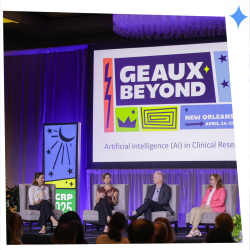From a 20,000-foot view of how artificial intelligence (AI) is already reshaping the conduct of clinical research and what its future uses may bring, to insights on innovative models to promote pathways into the profession, to a summary of trends in data strategies for health equity and inclusion in Europe, to an in-the-trenches chat on the basics of site budgeting best practices for clinical trials, ACRP 2025’s closing day activities on Sunday (April 27) continued to cover the broad spectrum of challenges and opportunities facing the enterprise in these exciting times.
Panelists bringing attendees up to speed on where the applications of AI to research are taking the profession included Noelle Gaskill, MBA, ACRP-CP, Vice President, General Manager of the Tempus TIME Network; Lisa Moneymaker, Head of Strategic Customer Engagement for Medidata Solutions; Pamela Tenaerts, MD, Chief Scientific Officer for Medable; and David Vulcano, LCSW, MBA, CIP, RAC, FACRP, Vice President for Clinical Research Compliance and Integrity at HCA Healthcare.
Instead of sticking one’s head in the sand to avoid the likely unavoidable infiltration of AI into more and more areas of life and work, the panelists’ consensus was that, if they aren’t already doing so, clinical researchers need to jump into using AI now in order to start enjoying its actual benefits. A quick poll of their audience found that, while 54% of respondents currently use AI in their professional roles, 62% are also worried about its use in relation to clinical trials.
Gaskill encouraged people to think of AI as less of a chaotic mother-in-law who keeps dropping into their lives uninvited and more as a helpful sister-in-law whose energetic efforts can bring hours of productivity back into one’s life. Meanwhile, Moneymaker opined that AI doesn’t fundamentally change the practice of clinical research, noting that, if there’s something you wouldn’t do with your study data before AI, you shouldn’t do it with AI now.
Vulcano used the analogy of AI as a chainsaw, saying that, as with any tool, we have to know how to use it responsibly and only in the right circumstances. “If we don’t define for the industry how AI will be used in clinical research, others will,” he added.
“It’s here to stay, and it can help us do more with less,” Tenaerts concluded.
For more information on this topic, check out this ACRP blog and the recently released ACRP White Paper on Responsible Oversight of Artificial Intelligence for Clinical Research Professionals.
Reported by Gary Cramer



